
Eugene Joseph McCarthy was an American politician, writer, and academic from Minnesota. He served in the United States House of Representatives from 1949 to 1959 and the United States Senate from 1959 to 1971. McCarthy sought the Democratic presidential nomination in the 1968 election, challenging incumbent Lyndon B. Johnson on an anti-Vietnam War platform. McCarthy unsuccessfully ran for U.S. president four more times.

The 1978 United States Senate elections were held on November 7, in the middle of Democratic President Jimmy Carter's term. The 33 seats of Class 2 were contested in regular elections. Special elections were also held to fill vacancies.

The 1976 United States Senate elections was an election for the United States Senate. Held on November 2, the 33 seats of Class 1 were contested in regular elections. They coincided with Democrat Jimmy Carter's presidential election and the United States Bicentennial celebration. Although almost half of the seats decided in this election changed parties, Carter's narrow victory did not provide coattails for the Democratic Party. Each party flipped seven Senate seats, although, one of the seats flipped by Democrats was previously held by a Conservative.

The 1972 United States Senate elections were held on November 7, with the 33 seats of Class 2 contested in regular elections. They coincided with the landslide re-election of Republican President Richard Nixon. Despite Nixon's landslide victory, Democrats increased their majority by two seats. The Democrats picked up open seats in Kentucky and South Dakota, and defeated four incumbent senators: Gordon Allott of Colorado, J. Caleb Boggs of Delaware, Jack Miller of Iowa, and Margaret Chase Smith of Maine. The Republicans picked up open seats in New Mexico, North Carolina, and Oklahoma, and defeated one incumbent, William B. Spong Jr. of Virginia.

The 1970 United States Senate elections was an election for the United States Senate. It took place on November 3, with the 33 seats of Class 1 contested in regular elections. Special elections were also held to fill vacancies. These races occurred in the middle of Richard Nixon's first term as president. The Democrats lost a net of three seats, while the Republicans and the Conservative Party of New York picked up one net seat each, and former Democrat Harry F. Byrd Jr. was re-elected as an independent.

The 1964 United States Senate elections were held on November 3. The 33 seats of Class 1 were contested in regular elections. Special elections were also held to fill vacancies. They coincided with the election of President Lyndon B. Johnson by an overwhelming majority, to a full term. His Democratic Party picked up a net two seats from the Republicans. As of 2023, this was the last time either party has had a two-thirds majority in the Senate, which allowed the Senate Democrats to override a veto, propose constitutional amendments, or convict and expel certain officials without any votes from Senate Republicans. However, internal divisions would have prevented the Democrats from having done so. The Senate election cycle coincided with Democratic gains in the House in the same year.

The 1958 United States Senate elections were elections for the United States Senate which occurred in the middle of President Dwight D. Eisenhower's second term. Thirty-two seats of Class 1 were contested in regular elections, the new state of Alaska held its first Senate elections for its Class 2 and 3 seats, and two special elections were held to fill vacancies.
Hubert Horatio Humphrey served as the 38th Vice President of the United States (1965–1969), as a United States senator from Minnesota, and as the 35th mayor of Minneapolis, Minnesota (1945–1948).

Electoral history of Walter Mondale, who served as the 42nd vice president of the United States (1977–1981); as a United States senator from Minnesota (1964–1976), and as the 23rd attorney general of Minnesota (1960–1964).

The 1996 United States Senate election in Minnesota was held on November 5, 1996. Incumbent Democrat Paul Wellstone won reelection to a second term defeating former Republican Senator Rudy Boschwitz in a rematch.
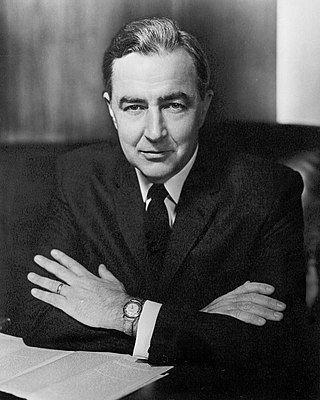
Electoral history of Eugene McCarthy, United States Senator (1959–1971) and Representative (1949–1959) from Minnesota. He was a member of the Minnesota Democratic-Farmer-Labor Party.

The 1982 United States Senate election in Minnesota was held on November 2, 1982. Incumbent Republican U.S. Senator David Durenberger was reelected to a second term over DFL nominee Mark Dayton.

The 1934 United States Senate election in Minnesota took place on November 6, 1934. Incumbent Farmer–Labor U.S. Senator Henrik Shipstead defeated former State Senator Nathaniel J. Holmberg of the Republican Party of Minnesota and U.S. Representative Einar Hoidale of the Minnesota Democratic Party to win a third term.
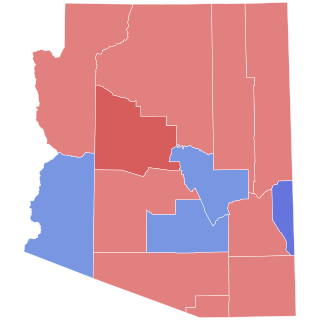
The 1958 United States Senate election in Arizona took place on November 4, 1958. Incumbent Republican U.S. Senator Barry Goldwater ran for reelection to a second term, and defeated former U.S. Senator, and then-Governor, Ernest McFarland in the general election. The election was a rematch from 1952, where Goldwater defeated McFarland by a narrow margin. Goldwater had attributed the 1952 win to the unpopularity of President Harry S. Truman and popular Wisconsin Senator Joseph McCarthy endorsing his campaign.
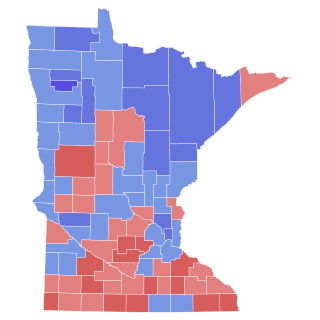
The 1958 United States Senate election in Minnesota took place on November 4, 1958. Democratic U.S. Representative Eugene McCarthy defeated incumbent Republican U.S. Senator Edward John Thye, who sought a third term. With his victory, McCarthy became the first Democrat ever to be popularly elected to Minnesota's Class 1 Senate seat.

The 1952 United States Senate election in Minnesota took place on November 4, 1952. Incumbent Republican Edward John Thye defeated Democratic challenger Bill Carlson to win a second term.
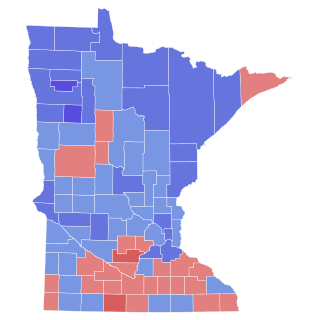
The 1960 United States Senate election in Minnesota took place on November 8, 1960. Incumbent Democratic U.S. Senator Hubert H. Humphrey defeated Republican Minneapolis Mayor P. Kenneth Peterson, to win a third term.

The 1966 United States Senate election in Minnesota took place on November 8, 1966. Incumbent Democratic U.S. Senator Walter Mondale, who had originally been appointed in 1964 to replace Hubert Humphrey after Humphrey was elected Vice President of the United States, defeated Republican challenger Robert A. Forsythe, to win a full term.
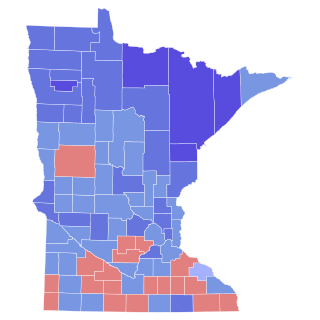
The 1970 United States Senate election in Minnesota took place on November 3, 1970. Incumbent Democratic U.S. Senator Eugene McCarthy opted not to seek reelection. Former Democratic U.S. Senator, former Vice President and 1968 presidential nominee Hubert Humphrey defeated Republican U.S. Representative Clark MacGregor.

The 1972 United States Senate election in Minnesota took place on November 7, 1972. Incumbent Democratic U.S. Senator Walter Mondale won re-election. Minnesota was one of fifteen states alongside Alabama, Arkansas, Colorado, Delaware, Georgia, Iowa, Louisiana, Maine, Mississippi, Montana, New Hampshire, Rhode Island, South Dakota and West Virginia that were won by Republican President Richard Nixon in 1972 that elected Democrats to the United States Senate.






















